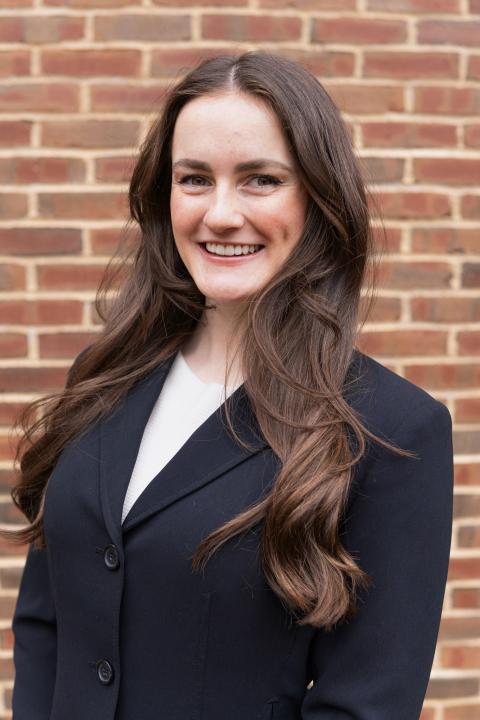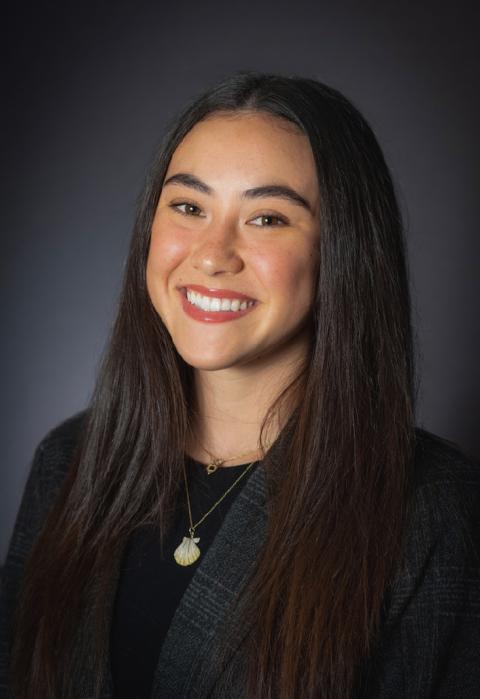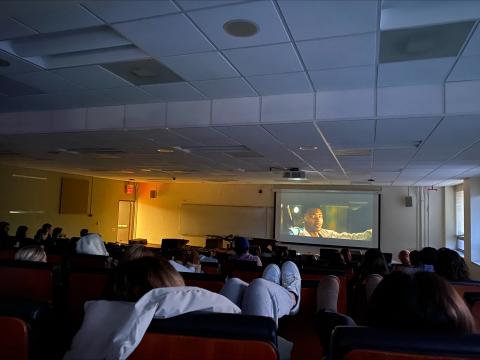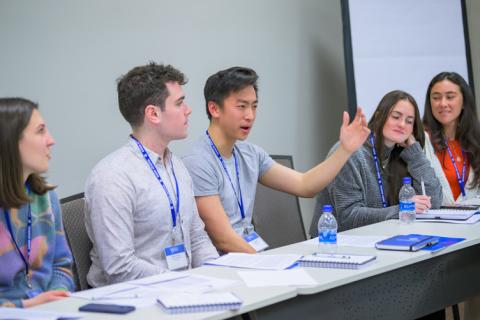Each year in April, Food Solutions New England's 21-Day Racial Equity Habit Building Challenge is hosted across the nation. Involving participants from all backgrounds and ages, the Challenge provides an opportunity for individuals to learn, reflect, and engage in discussion on topics relating to racial equity. Taking part in the three-week journey helps to raise awareness, open up new perspectives, and inspire change towards the future.
Participation in the Challenge is simple. Every morning, individuals who have registered for the Challenge receive a daily email prompt with a short reading, video, or audio file. The material centers around a topic on racial equity and is designed to generate further thought and reflection. The Challenge offers additional resources to explore afterwards, as well as a moderated online forum to discuss the content. UNH students also have the opportunity to participate in a suite of events hosted on campus that utilize the Challenge as a tool. One such opportunity is a series of three conversations led by student facilitators from the UNH Civil Discourse Lab (CDL), which are designed to initiate peer-to-peer discussion.

Hayleyann Gifford '23
This year, students Hayleyann Gifford ’23 (Communication: Business Application, Spanish Minor) and Mina O’Reilly ’23 (Communication: Business Application, Design Minor) are leading the CDL discussions. Both seniors at UNH, the two became involved with facilitating the conversations after learning about the opportunity from an academic professor. Prior to this experience, both had taken on several active roles in leadership, including the Audre Lorde Summit and discourse roundtable discussions at the University of Delaware. “After my sophomore year with COVID, I really wanted to get more involved with campus,” Hayleyann reflected. “I joined several different organizations on campus, but I felt like ‘this isn’t what I really want to be doing—I don’t feel like I’m really making a difference on campus, and I’m learning anything or self-improving’.” Things changed when she took several courses where both professors discussed the Civil Discourse Lab. Hayleyann eventually attended one of the community events discussing water resources, and was inspired to get more involved. “I realized that I was engaging with the community and talking across differences,” she said. “Having various people with diverse viewpoints around a table was such a meaningful experience. That’s when I said, I need to be a part of this.”

Melina (Mina) O'Reilly '23
As leaders of the CDL conversations, Hayleyann and Mina are passionate about creating a space where questions can be asked, and conversation is welcomed. “CDL is structured for discourse, not debate,” Mina explained. “You sit in rooms with people who might have an opposing view to yours, so the point is to listen other’s stories and opinions, create your own thoughts and ideas about it, and engage in a respectful setting.” It’s an environment designed to learn new things and bring to the surface racial inequities that might not be seen daily. Both agreed that the conversations were beneficial for not only those participating, but for themselves as moderators. “Our job is to be able to lead a discussion, but we’re also learning too,” Mina said. “We know the information, and attend trainings beforehand, but we aren’t experts. That’s why these conversations are growth opportunities for us as well.”
To prepare for the discussions, the two receive weekly material about the featured topic. They then share the content with participants, who are encouraged to join the conversations. “I think we’ve come down to the idea that people often don’t ever learn more about a topic because they’re afraid to offend, or say something ignorant,” Mina remarked. Most people, she added, are in the same place—wanting to learn more but being afraid. That’s why the two students work to establish ground rules for each conversation, such as listening authentically and refraining from negative language, but still encourage questions and discussion.
Learning to navigate silence has also been a critical part of being a facilitator. “Often times, I think what surprises us as moderators is when it occurs,” Mina said. “It’s hard because you really want to get the gears turning. I have to step back and ask, ‘if I were in students’ shoes right now, what could make we want to talk?’” Not all silence is detrimental either, she explained. Sometimes, it simply means that students are looking at the material and processing it. “What becomes an issue is when someone talks, and then there is silence around the room because people disagree, but don’t want to speak up,” Hayleyann said. “That’s when that silence is detrimental because then their opinions are not heard and we want to create a space that draws conversation out.” While there is a fine line between refraining from asking students to speak, since they aren’t obligated to, the goal is to encourage conversation and create an environment where individuals feel heard and equipped to speak.

Both Hayleyann and Mina participated in peer conversations regarding a film showing at UNH.
Reflecting on the experience, both described the personal growth and knowledge that came from being involved in the conversations. “It’s really bringing attention to things I probably wouldn’t have gone over if I wasn’t a part of the Racial Equity Challenge” Mina said. “The biggest thing about the REC is breaking patterns. A lot of people think, ‘it doesn’t apply to me, so I don’t need to learn about it.’ However, it does affect someone you know at least. At our discussions, we want to show others how it does apply to them.” Hayleyann also expressed the impact that the awareness gave students. “It’s easy to not think about these things; it’s convenient to not think about these things, but that’s not how we grow and that’s not how we progress as a society.” She added “CDL does a good job at this, in addition to the REC emails and conversations which only take a few minutes out of the day, yet have an impact that can follow you for an unmeasurable amount of time.”
Food Solutions New England is a regional network supported and coordinated by UNH’s Sustainability Institute and focuses on building unity around the following values: democratic empowerment, racial equity and dignity for all, sustainability, and trust.

Hayleyann and Mina attending roundtable civil discourse discussions at the University of Delaware.
